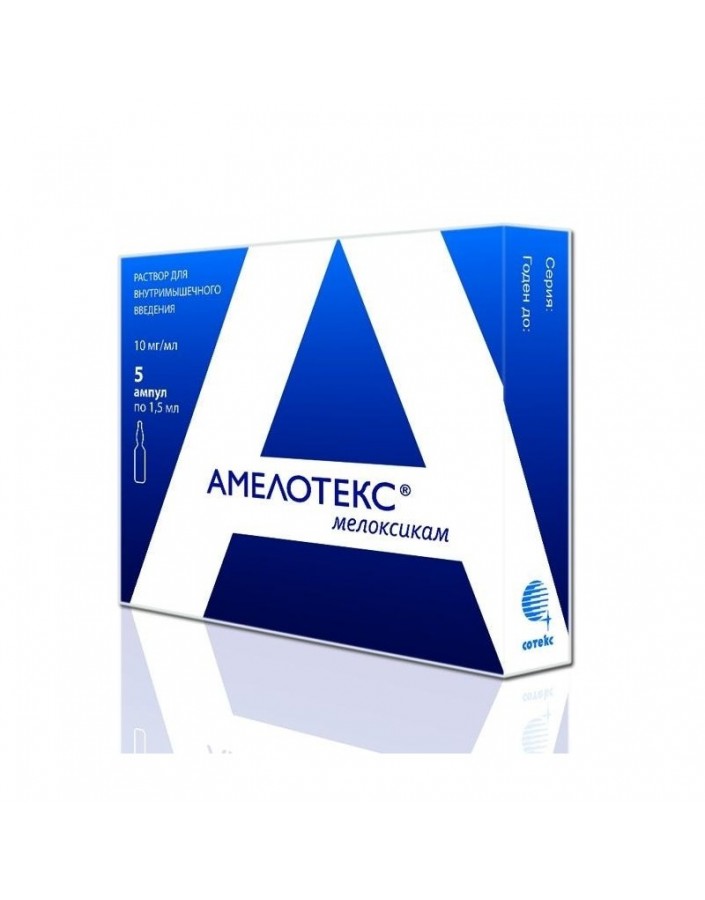



AMELOTEX AMPOULES 10MG/ML 1.5ML - 10PCS

Security policy (edit with Customer reassurance module)

Delivery policy (edit with Customer reassurance module)

Return policy (edit with Customer reassurance module)
Amelotex is a nonsteroidal anti-inflammatory drug that has anti-inflammatory, antipyretic, analgesic effects.
Selectively inhibits the enzymatic activity of cyclooxygenase-2. Inhibits prostaglandin synthesis in the area of inflammation to a greater extent than in the gastric mucosa or kidneys. Rarely causes erosive and ulcerative lesions of the gastrointestinal tract.
Belongs to the class of oxycams; an enolic acid derivative.
Rheumatoid arthritis; osteoarthritis; ankylosing spondylitis (ankylosing spondylitis); inflammatory and degenerative diseases of the joints, accompanied by pain.
Hypersensitivity to the active substance or auxiliary components;
Contraindicated in the period after coronary artery bypass surgery;
uncompensated heart failure;
Complete or incomplete combination of bronchial asthma, recurrent nasal polyposis and paranasal sinuses and intolerance to Acetylsalicylic acid and other nonsteroidal anti-inflammatory drugs (including history);
Erosive and ulcerative changes in the mucous membrane of the stomach or duodenum 12, active Gastrointestinal bleeding;
Inflammatory bowel disease (ulcerative colitis, Crohn's disease);
Cerebrovascular bleeding or other bleeding;
Severe liver failure or active liver disease;
Severe renal failure in patients not undergoing dialysis (creatinine clearance less than 30 ml / min), progressive kidney disease including. confirmed hyperkalemia;
Pregnancy, breastfeeding period;
Children's age up to 15 years.
With caution
To reduce the risk of adverse events, use the minimum effective dose of the shortest possible course for coronary heart disease, cerebrovascular diseases, congestive heart failure, dyslipidemia / hyperlipidemia, diabetes, peripheral arterial disease, smoking, creatinine clearance less than 60 ml / min, anamnestic data on the development of ulcerative lesions of the gastrointestinal tract, in the presence of Helicobacter pylori infection, in the elderly, with prolonged use and non-steroidal anti-inflammatory agents, frequent use of alcohol, severe somatic diseases, concomitant therapy following drugs: anticoagulant (e.g., warfarin), antiplatelet agents (e.g. acetylsalicylic acid, clopidogrel), oral steroids (e.g. prednisolone), selective serotonin reuptake inhibitor (such as citalopram, Fluoxetine, paroxetine, sertraline).
In the event of peptic ulcers or gastrointestinal bleeding, the development of side effects from the skin and mucous membranes of the drug should be canceled. In patients with reduced circulating blood volume and reduced glomerular filtration (dehydration, chronic heart failure, surgery), clinically severe chronic renal failure may occur, which is completely reversible after discontinuation of the drug (in these patients, daily diuresis and kidney function should be monitored at the beginning of treatment). With a persistent and significant increase in transaminases and changes in other indicators of liver function, the drug should be canceled and control tests should be conducted. In patients with an increased risk of side effects, treatment begins with a dose of 7.5 mg. In the terminal stage of chronic renal failure in patients on dialysis, the dose should not exceed 7.5 mg / day. During the period of treatment, care must be taken when driving vehicles and engaging in other potentially hazardous activities that require increased concentration and psychomotor speed (with the appearance of dizziness and drowsiness).
1 vial (1.5 ml) contains meloxicam as the active substance - 15 mg;
Excipients: meglumine, glycofurfurol, poloxamer 188, sodium chloride, glycerol, sodium hydroxide solution 1 M, water for injection.
Amelotex is administered intramuscularly, deeply - 7.5 - 15 mg 1 time per day.
With a slight or moderate decrease in renal function (creatinine clearance more than 25 ml / min), as well as with liver cirrhosis in a stable clinical state, dose adjustment is not required. The initial dose in patients with an increased risk of side effects is 7.5 mg / day.
The maximum daily dose is 15 mg, and in patients with severe renal failure on hemodialysis, it is 7.5 mg.
Gastrointestinal: nausea, vomiting, belching, abdominal pain, constipation or diarrhea, flatulence, increased activity of liver transaminases, hyperbilirubinemia, stomatitis, erosive and ulcerative lesions of the gastrointestinal tract, esophagitis, gastritis, colitis, perforation of the gastrointestinal tract, gastrointestinal - intestinal bleeding (latent or overt), hepatitis.
Nervous system: dizziness, vertigo, headache, tinnitus, confusion, drowsiness, disorientation, emotional lability.
Respiratory: bronchospasm.
From the side of blood-forming organs: anemia, leukopenia, thrombocytopenia.
Cardiovascular: peripheral edema, increased blood pressure, "flushes" of blood to the skin of the face and upper chest, heartbeat.
Urogenital:edema, hypercreatininemia, increased serum urea concentration.In rare cases, acute renal failure, interstitial nephritis, albuminuria, hematuria.
Special senses:conjunctivitis, visual impairment including blurred vision.
From the skin: itching, skin rash, urticaria, photosensitivity, bullous rashes, erythema multiforme, toxic epidermal necrolysis.
Allergic reactions:angioedema, anaphylactoid, Anaphylactic reactions.
Local reactions: possible burning and pain at the injection site.
In the dark place at a temperature of from 8 to 25 ° C.
Conditions of sale from pharmacies Prescription of the doctor